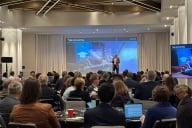You have /5 articles left.
Sign up for a free account or log in.
-130d7.jpg?itok=k5-HziKi)
A faculty member teaches a student at University of Colorado at Boulder College of Music. The college has developed a variety of music-related microcredentials in recent years.
CU Boulder College of Music
John Davis, dean of the College of Music at University of Colorado at Boulder, finds that today’s music students want more than a traditional music education. Many want the technical skills to compose and produce tracks on their laptops or to pursue new kinds of music careers, such as writing scores for video games.
To meet that demand, the College of Music has developed a set of microcredentials in recent years, including an undergraduate badge in arts administration and certificates in topics including music technology, singing health and music entrepreneurship. The last comes with a minor in business in partnership with the university’s business school.
“We’re seeing students having to almost develop their own skills to meet the market, and we want to instead help them get where they want to go by providing a variety of these opportunities and experiences,” he said. “… We get calls, I’m not exaggerating, every day from students who are seeking an institution and a program that will offer them these additional experiences.”
His institution isn’t the only one building alternative pathways in the arts.
Colleges have recently begun to rapidly expand their microcredential offerings as state lawmakers clamor to fill workforce gaps and students question the value of a traditional degree. Such nondegree options have mostly proliferated in career and technical education fields, such as cybersecurity, information technology and welding. But some institutions are starting to branch out into microcredentials in the liberal arts disciplines, hoping to capitalize on the hype surrounding these flexible alternatives to degree programs and highlight the market value of the humanities, arts and social sciences.
“We’re certainly seeing that trend,” said Lynn Pasquerella, president of American Association of Colleges and Universities. For example, the University at Buffalo, in New York, offers a microcredential in theoretical humanities that promises on its website to build up students’ communication, critical thinking and “equity and inclusion” skills. Purdue University Global lists an arts and humanities microcredential intended to train employees to demonstrate “flexibility in critical thinking, ethical reasoning, problem solving, and openness to experience.”
Pasquerella noted that the rise of generative artificial intelligence has only exacerbated students’ doubts about whether a bachelor’s degree can yield them a job and “future proof” work skills.
Meanwhile, at a time when more and more tasks can be automated, employers are emphasizing the kinds of “soft” or “durable” skills that a liberal arts education typically provides, she said.
“Employers are increasingly looking for competencies and dispositions in their employees that focus on critical thinking, leadership, self-awareness, empathy, adaptability, resilience, complex communication with people from diverse backgrounds, speaking across differences and having a growth mindset,” Pasquerella said.
She noted that a 2019 survey of 2,000 American adults by Quest Research Group found that when respondents were asked to imagine themselves as employers, 61 percent said they’d hire an English major with an industry-recognized credential over a cybersecurity major or an English major without any additional credentials.
Such findings indicate that despite “a push toward narrow technical training and STEM initiatives at the expense of humanities programs,” the labor force demands more than just technical skills from graduates, Pasquerella said—and colleges are responding to that.
“I think this is a trend that will increase over the next few years,” she added.
Rebranding the Liberal Arts
Allegheny College, a liberal arts institution in Pennsylvania, launched a pilot program in fall 2022 that offered four digital badges, including software development with Python, programming with web technologies, data analysis with Python and R, and content creation, which involved both art and computer science courses.
Byron Rich, assistant provost of academic innovation and an associate professor of art at Allegheny, said he sees the college’s microcredentials as “repackaging” the workforce skills its degree programs already offer but in ways that are more readily apparent to students and employers.
“The power of understanding context, history, public speaking … persuasive writing, all those soft skills are transformational for our students, but it was increasingly difficult for parents, students and employers to understand those soft skills” and how degree programs delivered them, he said.
He believes colleges are increasingly offering microcredentials in creative fields because they help to show the workforce “potential that exists within disciplines that are often sort of marginalized as impractical degrees.”
The college plans to ramp up its microcredential offerings to at least 16 programs this coming fall, including industrial design, editing and publishing, filmmaking and curatorial studies, focused on art history. The badges are designed to go on students’ LinkedIn pages as a signal to employers that they’ve mastered a set of skills.
The goal is to make sure “our students have the tools to be able to best tell their academic story,” Rich said. “We really wanted to ensure they have a quiver of academic tools to best represent what they’ve learned.”
Students are enthusiastic about the new options. At least 7 percent of the college’s roughly 1,450 students are now pursuing a total of 171 microcredentials through the pilot program. Faculty members were initially “skeptical,” Rich said, and worried that microcredentials weren’t in line with the college’s liberal arts mission. But after being heavily involved in developing the programs, they’ve since come around, he added.
For Pasquerella, it doesn’t matter whether students get their liberal arts education in the form of a degree, microcredentials or both.
“It’s fine as long as they’re getting the skills, competencies, [and] knowledge necessary to apply them in the workforce and for lifelong learning,” she said.
Vijay Khatri, dean of the business school at the University of Colorado at Boulder, added that offerings such as the music entrepreneurship certificate, with the bonus business minor, give students not just the skills they need for a particular career path but also transferable skills they can rely on as a fallback plan.
Music students “need to know both how to manage their own business portfolio as a musician and also … to be able to transition, should their ambition of being a musician not go through,” he said.
Davis believes those kinds of microcredentials are only going to grow more popular with students, and could even play an important role in college enrollment patterns. While the college of music hasn’t had enrollment troubles, he said, he thinks institutions that ignore student demand for such programs could struggle in the future.
“Across the nation, we’re hearing from parents who want to know that the training their student is getting is actually going to be relevant towards a career,” he said. “We’re hearing from students about interests that we never considered before.”

.png)

